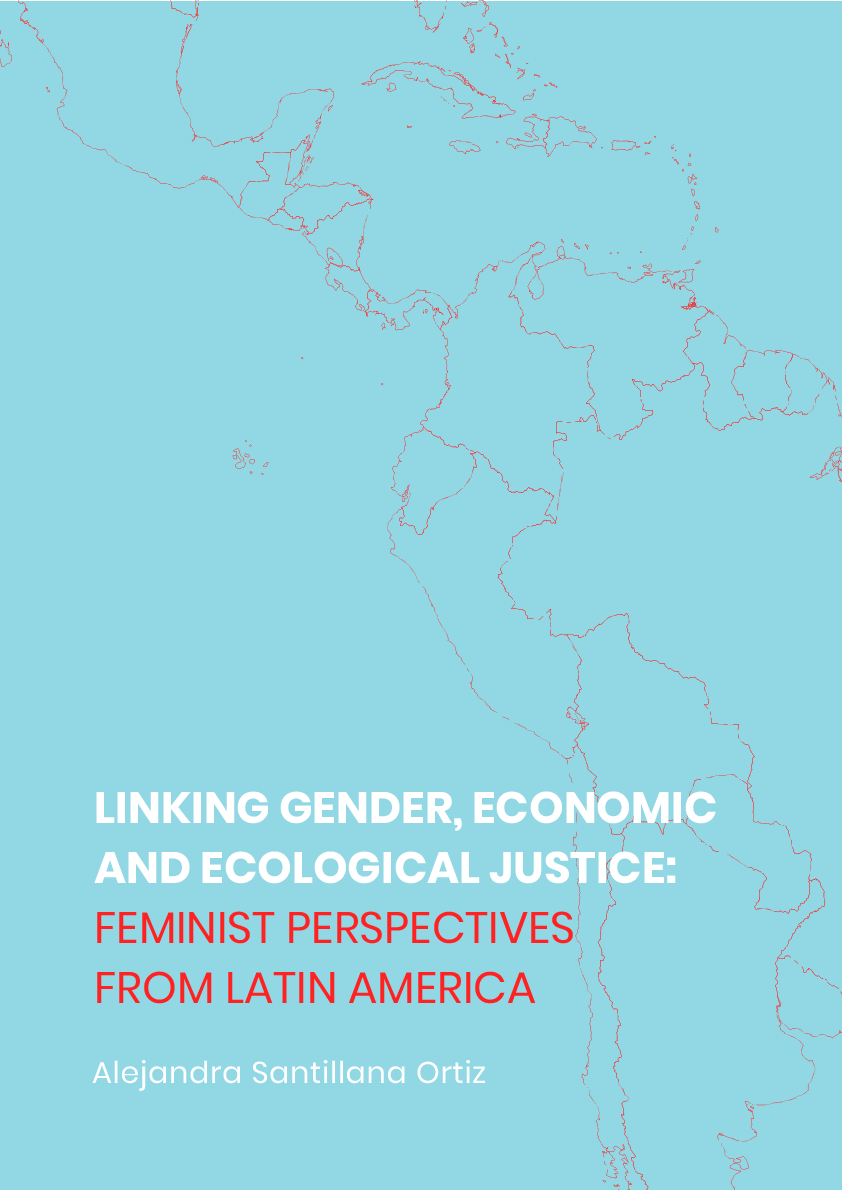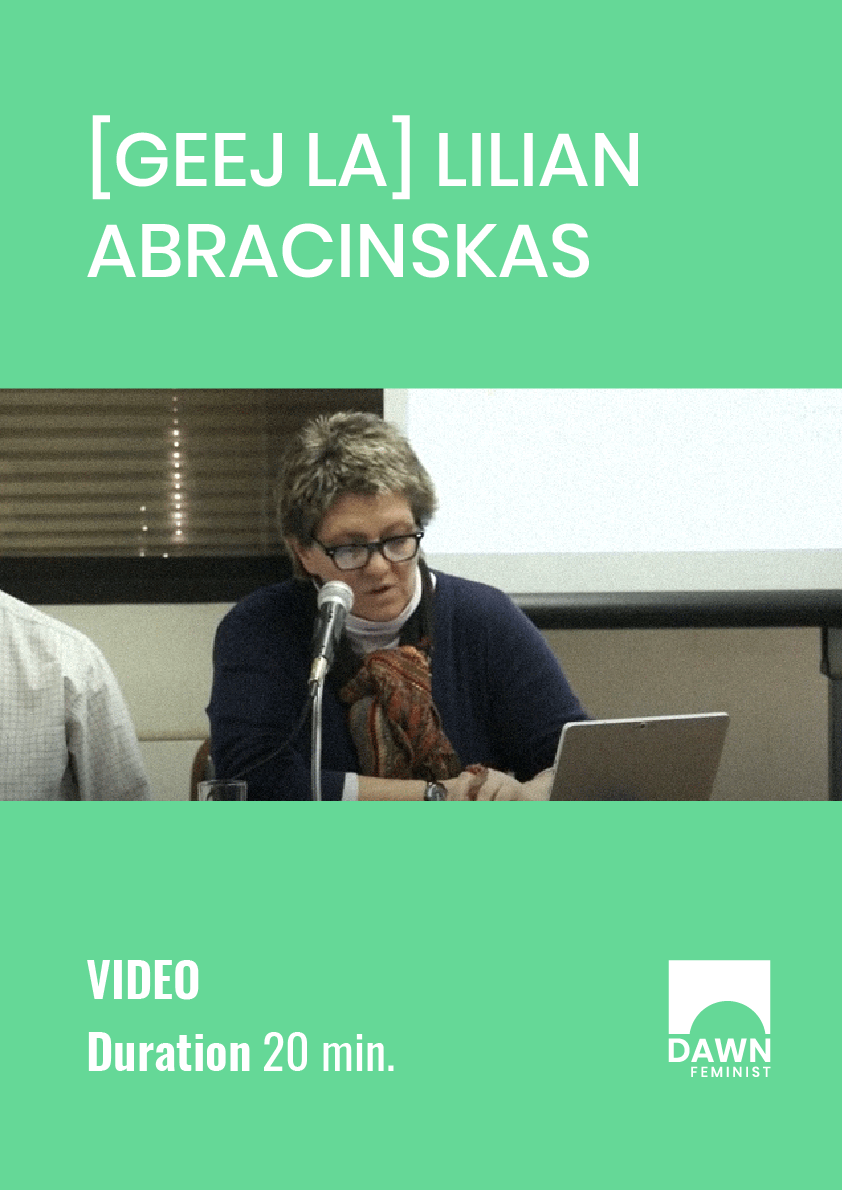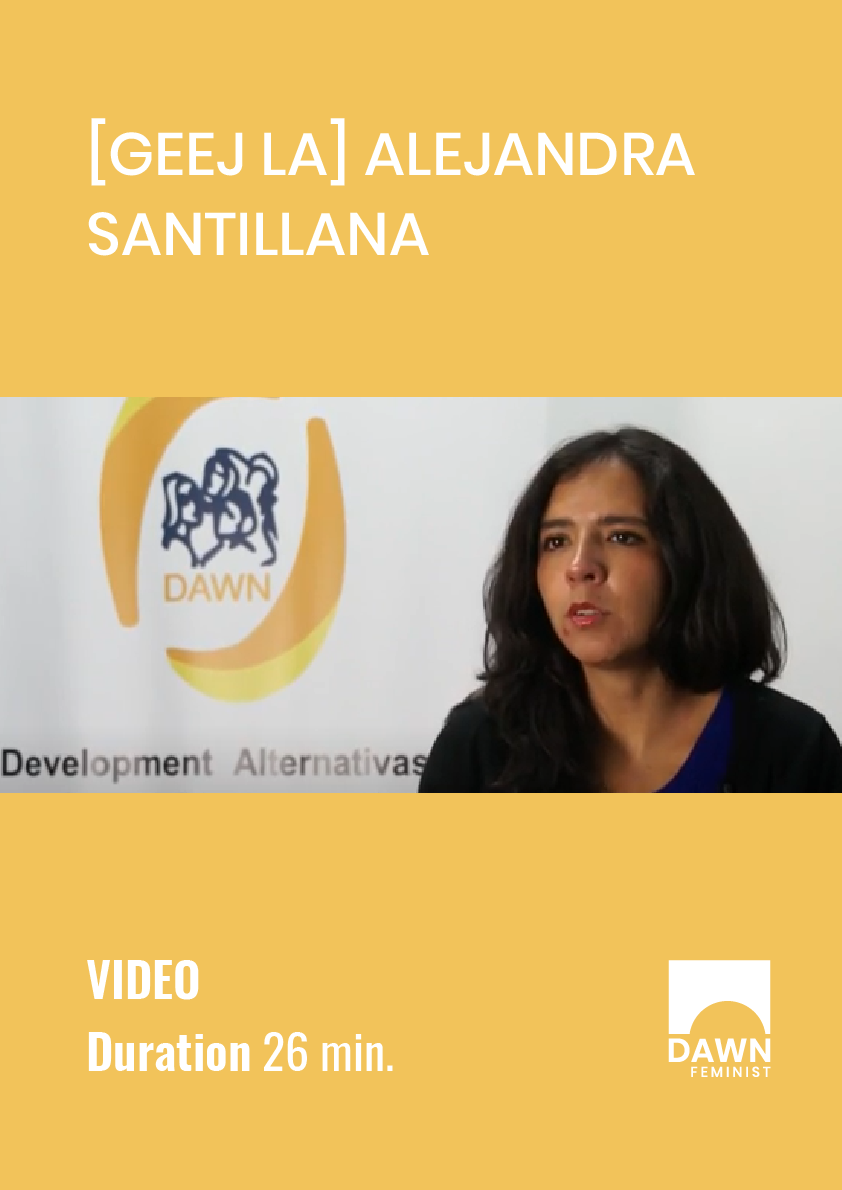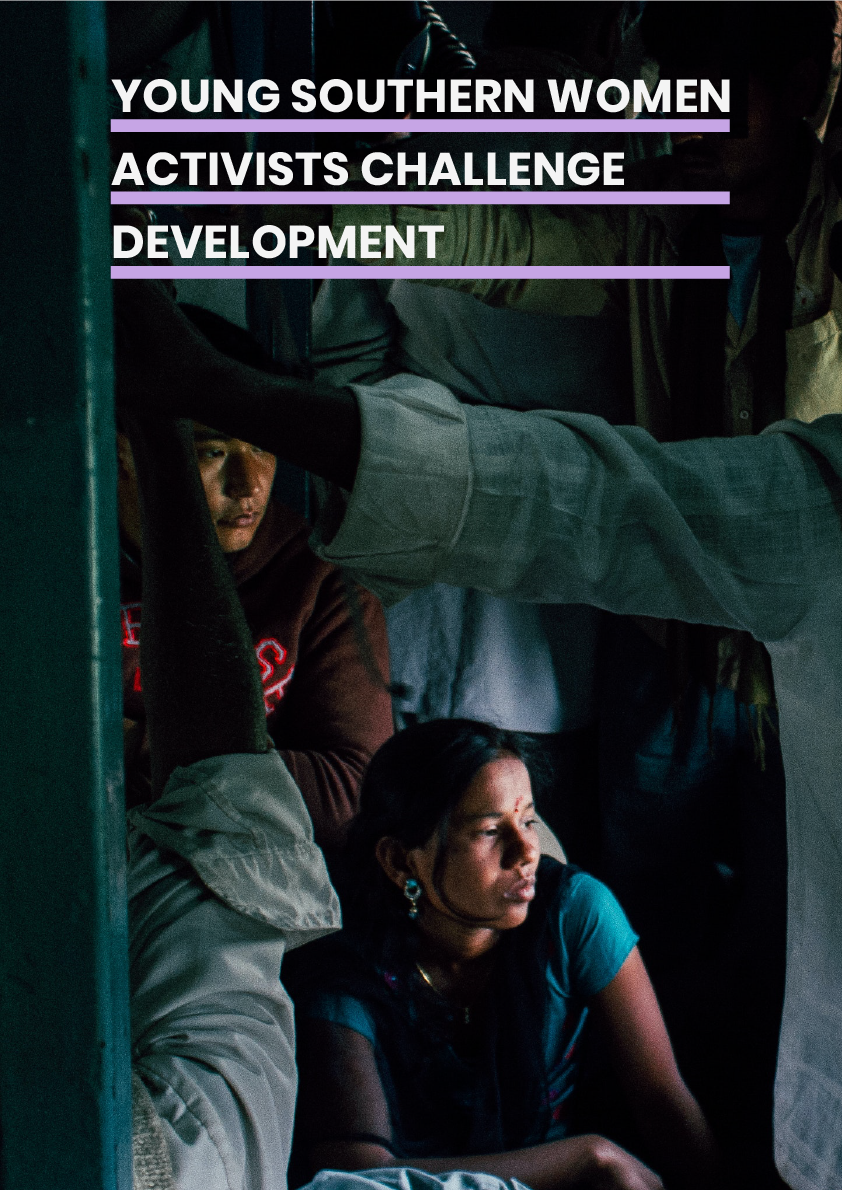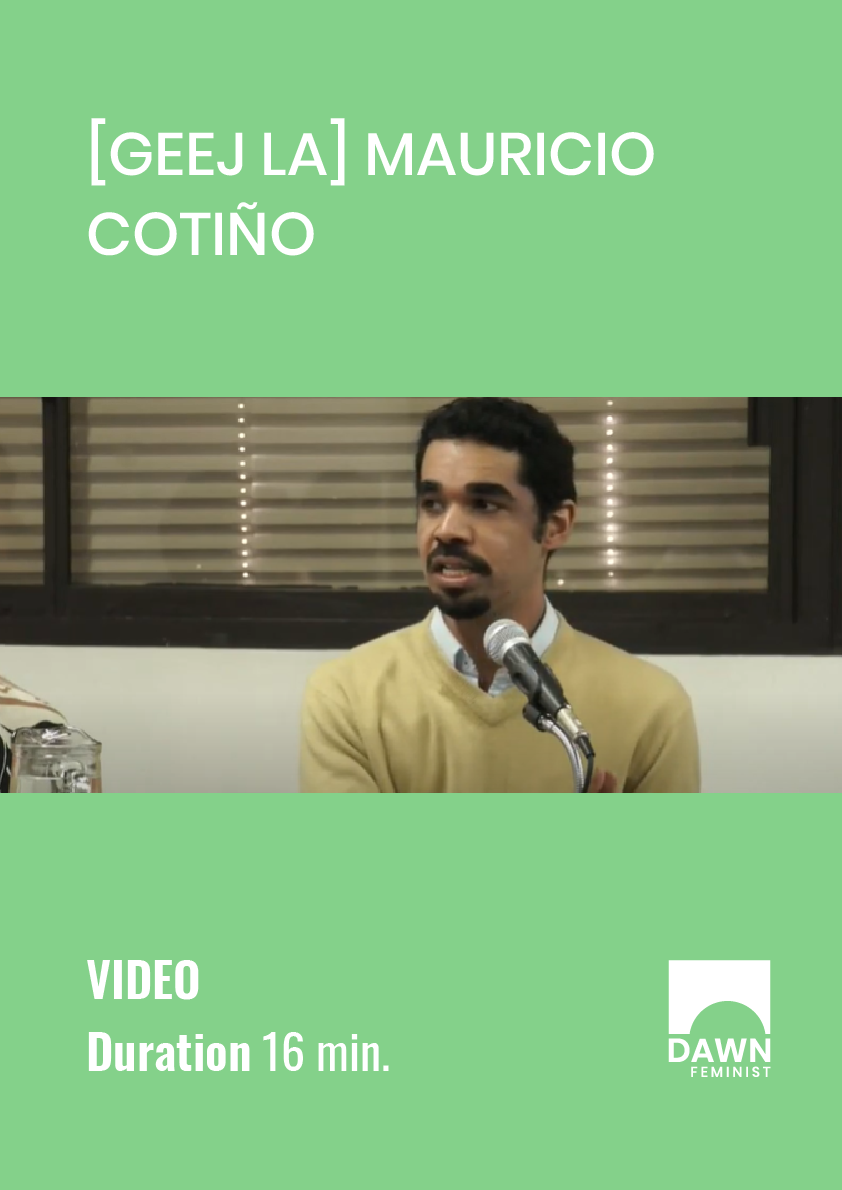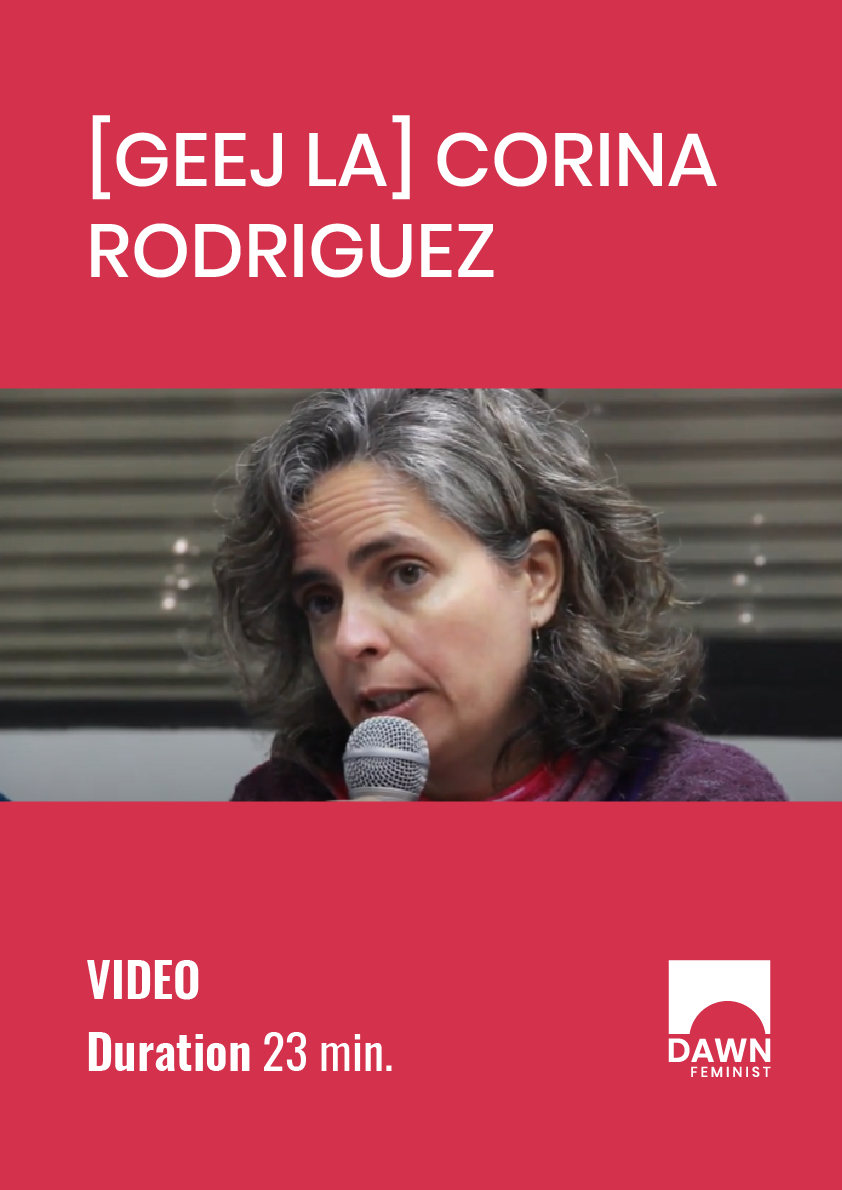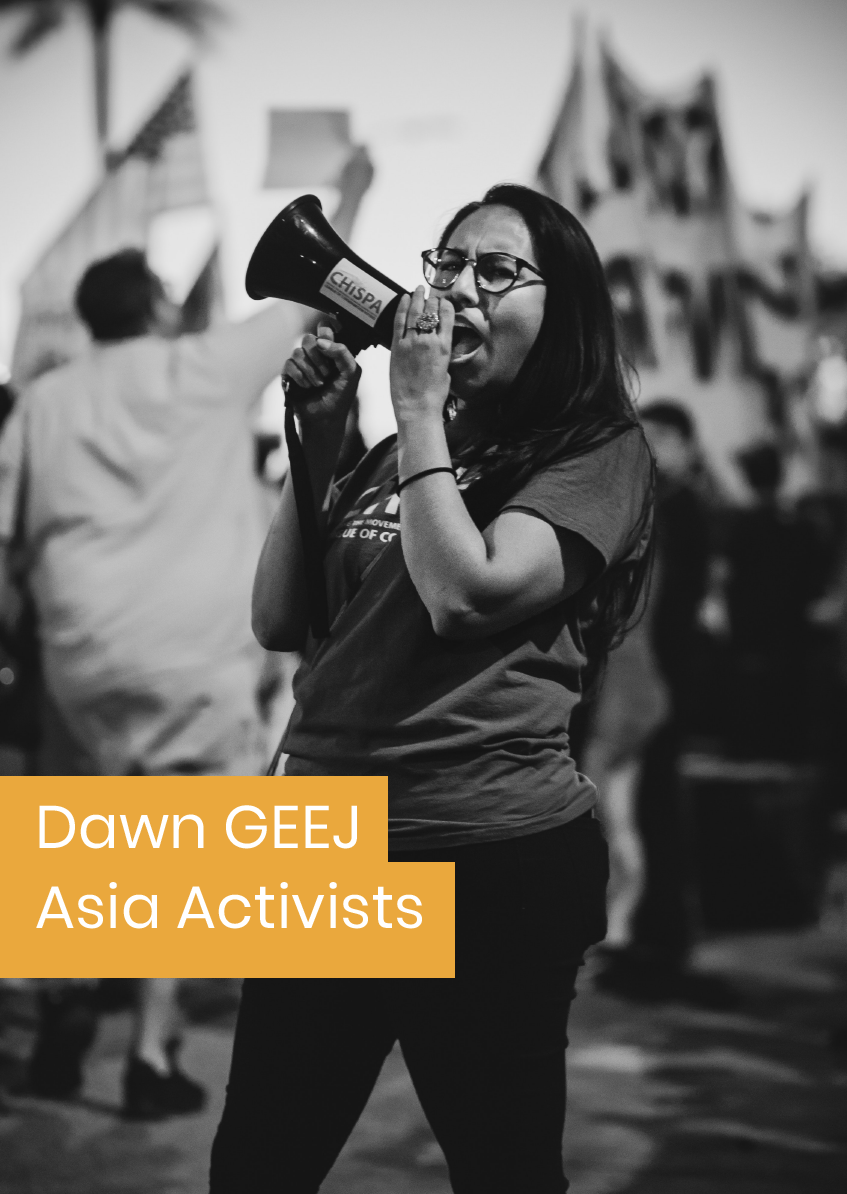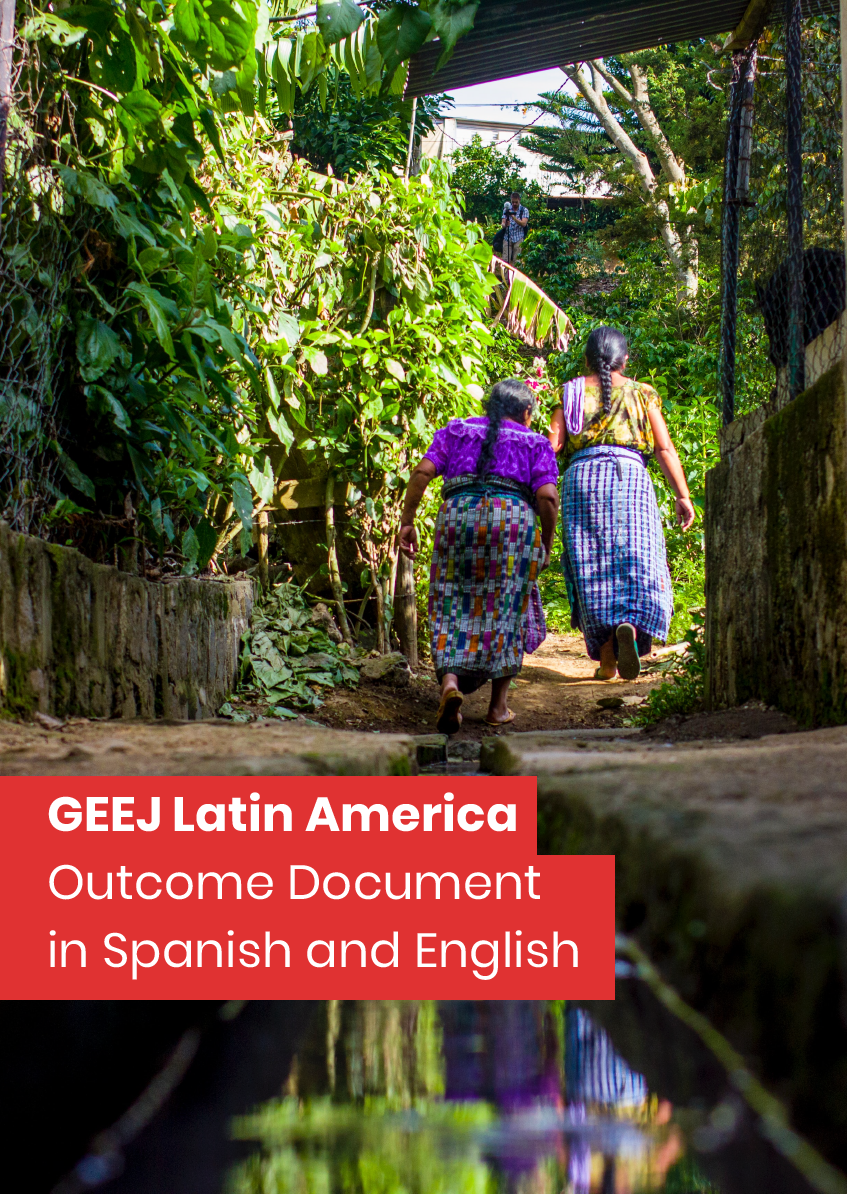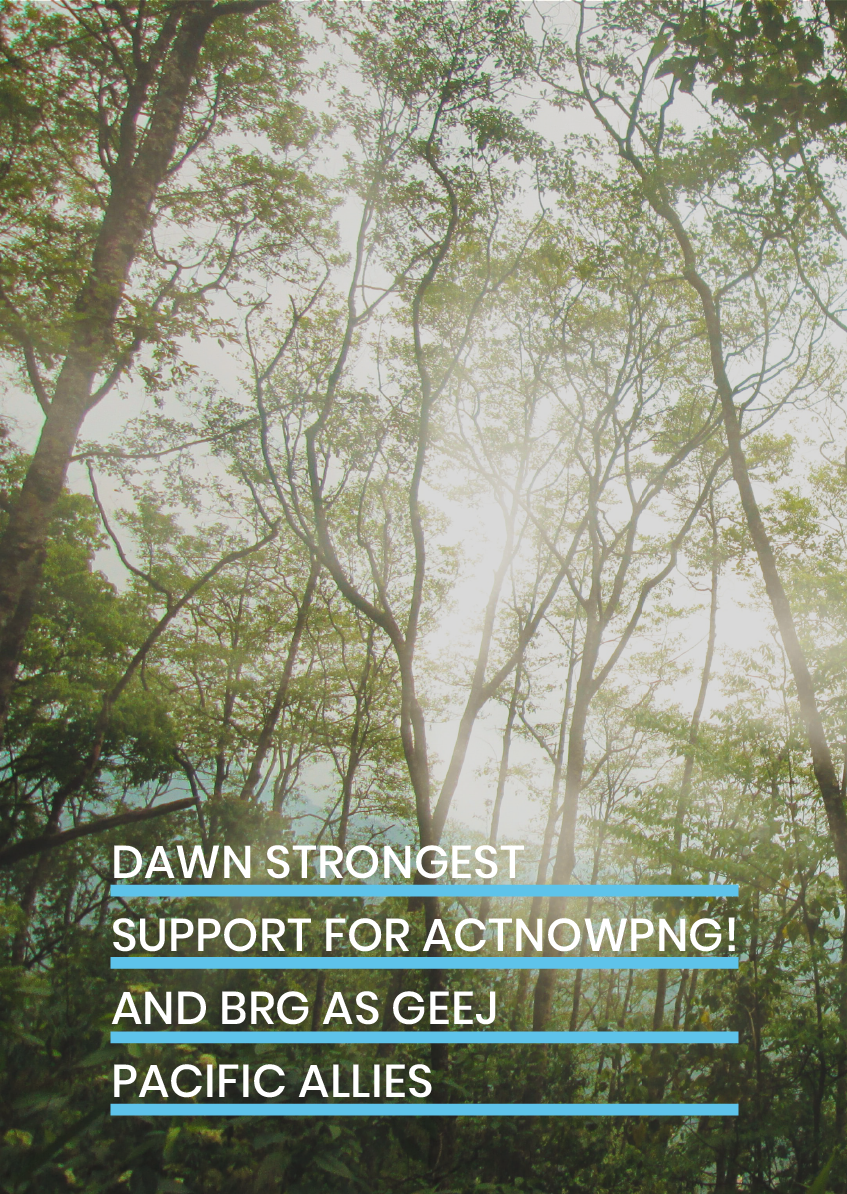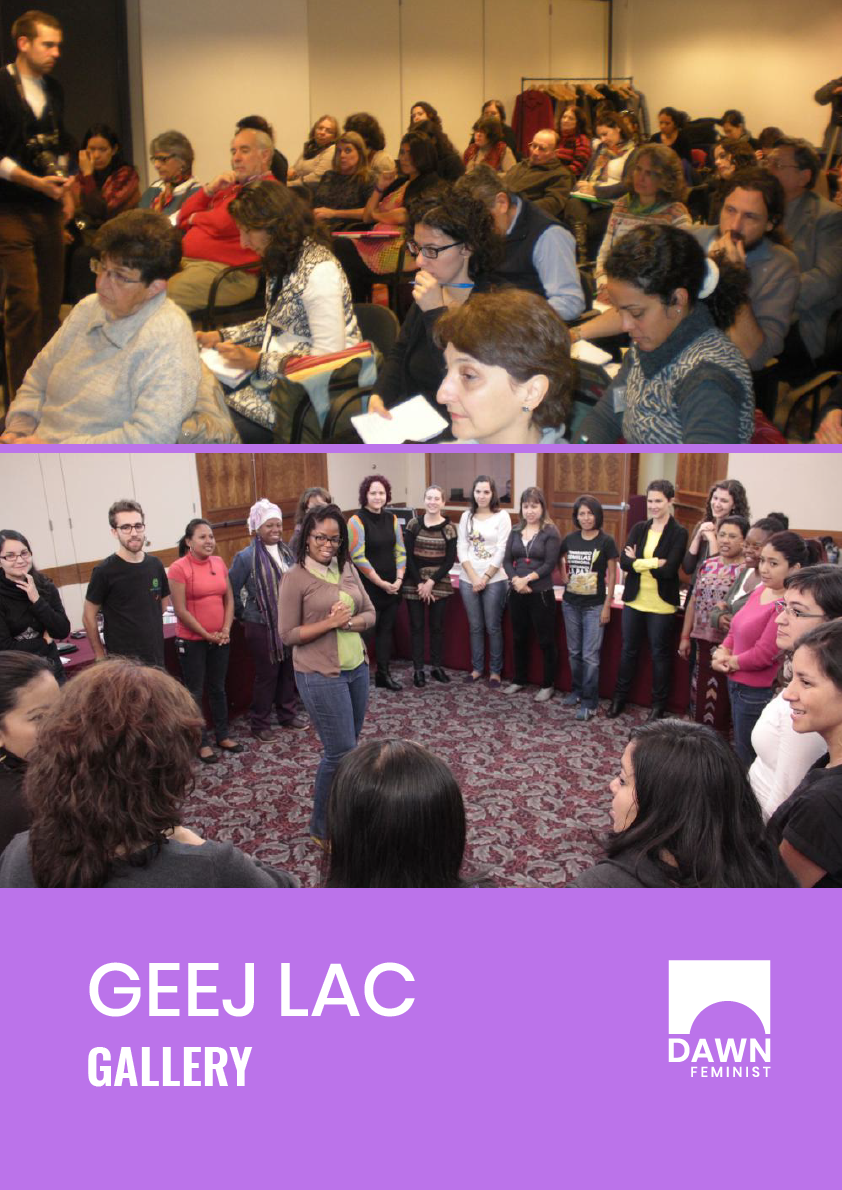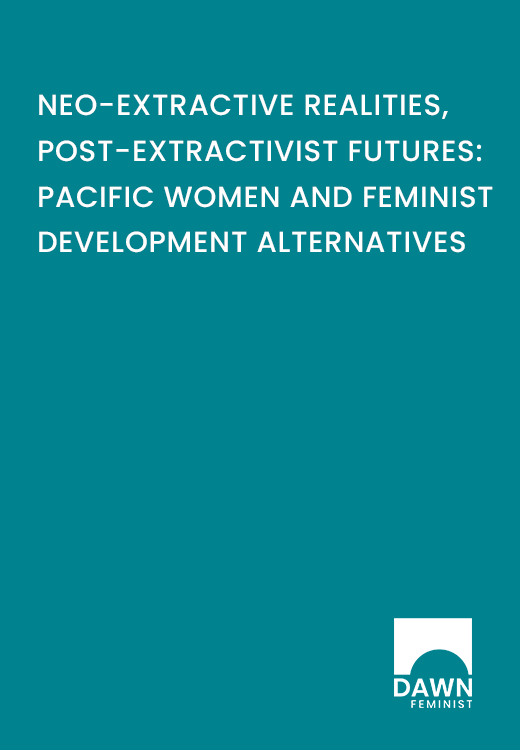In acknowledgement of the urgent need for more effective and interlinked regional feminist responses from the economic South, involving and in support of women advocates working in areas of gender and development, DAWN has been organising a series of regional consultations and training institutes since 2010 on “Strengthening Policy Analysis and Advocacy on Gender, Economic and Ecological Justice” – the GEEJ series in short – in the Pacific, Africa, Latin America, Caribbean and Asia.
This project brings together actors working in the areas of gender, economic and ecological justice in settings where people can raise difficult questions and political challenges in an atmosphere of trust and collective reflection. Participants include researchers and analysts from academia and civil society; policy makers from government, intergovernmental and regional institutions; and young and local women activists.
The training institutes and consultations aim to provide venues for sharing information on a range of global and regional responses to the world’s multiple crises, including new initiatives that challenge hegemonic thinking and systems in finance, trade and monetary, and environmental policymaking; mapping current measures, mechanisms and programmes at national and regional levels; and discussing possibilities, constraints and contradictions. The women’s rights activists from local and regional organisations will have their own facilitated input process.
Through this process, DAWN also hopes to encourage young feminists and women’s rights advocates to increase their engagement in transforming global economic and climate change governance structures; build capacity in policy analysis and advocacy on key gender, economic and climate justice issues, and their interlinkages; and encourage solidarity and support to contribute to policy proposals and social movement activism toward and during regional and global policy advocacy targets.
The GEEJ series began in the Pacific in September 2010, followed by Africa in November 2010, Latin America and the Caribbean in March 2011, the Mekong Region in April 2012, Pacific in October 2012 and Latin America in August 2013.
GEEJ Latin America 2013
Interlinking Gender, Economic and Ecological Justice in Latin America: Towards a Development based on the Sustainability of Life (October 2013). Written by Nicole Bidegain Ponte and Masaya Llavaneras Blanco, based on the discussions and recommendations made by the Regional Consultation “Interlinking Gender, Economic and Ecological Justice in Latin America”, organized by DAWN, on August 16-18, 2013, in Montevideo, Uruguay and which gathered members of feminist and youth organizations, academics and social movements’ activists from Argentina, Barbados, Bolivia, Brazil, Ecuador, Mexico, Peru, Uruguay and Venezuela.
Los vínculos entre la justicia económica, ecológica y de género en América Latina: Caminos hacia un desarrollo centrado en la sostenibilidad de la vida” (Octubre de 2013). Escrito por Nicole Bidegain Ponte y Masaya Llavaneras, basado en las discusiones y recomendaciones elaboradas en la Consulta Regional: “Los vínculos entre la justicia económica, ecológica y de género en América Latina”, organizada por DAWN entre el 16 y 18 de agosto de 2013 en Montevideo, Uruguay que reunió integrantes de organizaciones feministas, de jóvenes, académicas-os y activistas de movimientos sociales provenientes de Argentina, Barbados, Bolivia, Brasil, Ecuador, México, Perú, Uruguay y Venezuela.
GEEJ Asia 2012
The DAWN Regional Consultations and Training Institute on Strengthening Policy Analysis and Advocacy on Gender, Economic, and Ecological Justice (GEEJ) in Asia was held at the Mae Fah Luang University in Chiang Rai, Thailand, on 4-7 April 2012. Twenty-five young women advocates in from 10 countries in Asia gathered to discuss the linkages between gender, economic and ecological justice in the region, with emphasis on the Greater Mekong Sub-region (GMS). The GEEJ Asia regional consultations and training institute were led by the DAWN GEEJ Team composed of Gigi Francisco, Marina Durano, Cai Yiping, Kumudini Samuel, Noelene Nabulivuo, and Anita Nayar; as well as resource persons Dr. Kyoko Kusakabe of the Asian Institute of Technology and Dr. Romyen Kosaikanont of Mae Fah Luang University. The GEEJ Asia follows a series of GEEJ consultations in Latin America, the Pacific, and Africa.
GEEJ Latin America 2011
Latin America Regional Consultation and Training Institute on Gender Economic and Ecological Justice
(See Spanish version below)
In collaboration with the Gender and Education Office (GEO) of the International Council for Adult Education (ICAE), the third round of the Gender, Economic and Ecological Justice (GEEJ) series commenced on March 18, 2011 in Montevideo, Uruguay with a Training Institute for young women activists from Latin America, and a regional consultation including representatives from civil society networks and organizations, and governments.
DAWN General Coordinator, Gigi Francisco and ICAE Secretary General Celita Eccher welcomed participants who are working alongside DAWN and ICAE facilitators from Uruguay, India, Philippines, Madagascar and Fiji, building on shared knowledge of linkages between gender, economic and environmental justice, and enhancing intergenerational capacities within women’s movements at the regional level.
In a world fragmented by multiple and contesting multilateralisms and interlinked crises of ‘food, fuel, finance and fahrenheit’,[1] Latin America and the Caribbean have made inroads to political re-structuring with the rise of several progressive governments. Nevertheless, questions around persistence of orthodox economic policies including reliance on extractive industries, as well as concerns over the degree and sustainability of social transformation remain. The high growth rates from competitiveness in global markets being pursued in the region mask important inequalities related to territory, representation, gender identity and sexual orientation, ethnicity and race. Alternative principles and perspectives as found in the concept of Buen Vivir/Vivir Bien had emerged and been institutionalized. However, there are ongoing debates on how this translates to more coherent policies and programs that would decidedly move the path of development away from neoliberal policies and achieve emancipation for all groups concerned, women included.
It is within this context that the GEEJ Latin America Training Institute and Regional Consultation took place as a way of generating feminist reflections on the multifaceted challenges confronted by the region. This was done through a collective and interlinked analysis of current development, gender and ecological justice and rights issues utilizing mutual learning methods that rely on participants’ advocacy experiences.
The consultation contributors were Cecilia Lopez of Agenda Foundation Colombia, Alma Espino of CIEDRU/IGTN Uruguay, Masaya Llavaneras from Venezuela, Alicia Torres of CEFIR Uruguay, Federico Ferla of UNDP Uruguay, Moema Viezzer of COMSOL Brazil, Martha Rico of Flora Tristan Peru and Eduardo Gudynas of CLAES Uruguay. A public forum on March 21st at the Salon Dorado of the Municipal Hall, supported by the UN Women and the Women’s Office of the Municipality of Montevideo, concluded the event. Regional and cross-regional GEEJ activities continue in the lead up to the Earth Summit, Rio+20 in May 2012.
***
Consulta regional en América Latina sobre sobre Justicia de Género, Económica y Ecológica
En colaboración con la Oficina de Educación y Género (GEO) del Consejo Internacional de Educación de Personas Jóvenes y Adultas (ICAE), el 18 de marzo del 2011 comenzó en Montevideo la tercera actividad de la serie sobre Justicia de Género, Económica y Ecológica (GEEJ) con un Instituto de Capacitación para jóvenes mujeres activistas de América Latina y una consulta regional incluyendo a representantes de redes y organizaciones de la sociedad civil y gobiernos.
La Coordinadora General de DAWN, Gigi Francisco, y la Secretaria General del ICAE, Celita Eccher, dieron la bienvenida a las participantes quienes están trabajando junto con las facilitadoras de DAWN e ICAE provenientes de Uruguay, India, Filipinas, Madagascar y Fiji, a partir de conocimiento compartido sobre los vínculos entre justicia de género, económica y medioambiental, fortaleciendo las capacidades intergeneracionales entre movimientos de mujeres a nivel regional.
En un mundo fragmentado por multilateralismos múltiples y en competencia, así como por crisis interrelacionadas de “alimentos, combustible, finanzas y Fahrenheit ‘[2], América Latina y el Caribe han logrado avances de reestructuración política con el surgimiento de varios gobiernos progresistas. Sin embargo, persisten interrogantes sobre la continuidad de políticas económicas ortodoxas incluyendo la dependencia de las industrias extractivistas así como preocupaciones sobre el grado de sustentabilidad de las transformaciones sociales. Los altos niveles de crecimiento asociados a la competitividad en los mercados globales que se está persiguiendo en la región encubren importantes desigualdades relacionadas con el territorio, la representación, la identidad de género y la orientación sexual, la etnicidad y la raza. Han surgido y se han institucionalizado principios y perspectivas alternativas como las que encontramos en el concepto de Buen Vivir. Sin embargo, hay debates en marcha sobre cómo esto se traduce en políticas y programas más coherentes que puedan alejar decididamente el camino del desarrollo de las políticas neoliberales y lograr la emancipación para todos los grupos involucrados, incluidas las mujeres.
Es en este contexto que se organiza esta capacitación y consulta regional GEEJ en América Latina como una manera de generar reflexiones feministas sobre los desafíos multifacéticos a los que se enfrenta la región. Esto se hace a través de un análisis colectivo y de múltiples vinculaciones sobre el desarrollo actual, la justicia de género y ecológica y asuntos de derechos, utilizando métodos de aprendizaje mutuo que se basan en las experiencias de incidencia de las participantes.
Entre quienes contribuyeron a la consulta se encuentran Cecilia López de la Fundación Agenda de Colombia, Alma Espino de CIEDUR/IGTN Uruguay, Masaya Llavaneras de Venezuela, Alicia Torres de CEFIR Uruguay Federico Ferla del PNUD Uruguay, Moema Viezzer de COMSOL Brasil, Martha Rico de Flora Tristán Perú y Eduardo Gudynas de CLAES Uruguay. Cerró la actividad un foro público que tuvo lugar el 21 de marzo en la Sala Dorada de la Intendencia de Montevideo con el apoyo de ONU Mujeres y la Secretaría de la Mujer de la Intendencia. Se continuarán realizando actividades GEEJ regionales e inter regionales en preparación hacia la Cumbre de la Tierra, Río +20 en mayo del 2012.
GEEJ Africa 2010
Africa Regional Consultation and Training Institute on Strengthening Policy Analysis and Advocacy on Gender, Economic and Ecological Justice
A regional consultation and training institute on Gender, Economic and Ecological Justice (GEEJ) was held in Accra, Ghana from 20-23 November 2010. This event was the 2nd in a regional sortie of Development Alternatives with Women for a New Era (DAWN). For this segment, Ghana-based Third World Network – Africa (TWN-Africa) collaborated with DAWN.
The human expression of structural economic distortions and policy failures of African economies, in particular were magnified by the global crises, reinforcing unequal power relations by further skewing production, distribution and consumption, and thereby magnifying differences between various social groups and men and women. The poor, the powerless and the vulnerable social groups – of which women constitute the large majority – thus continue to bear the brunt of the global crises.
Exacerbated by severe food, energy and climate crises, the global financial and economic crises have gravely penalised women. Jobs and means of livelihood have been lost and the public revenue reduced ; social services have become out of reach of an increased number of impoverished people; and social protection systems are under threat by neoliberal policies, such that women serve ever-increasingly as the surrogate safety nets for families and communities affected by the negative impacts of the triple crises.
Moreover, finance, food and climate challenges are still separately addressed in their distinct policy silos against a backdrop of continuing lack of political will for public action on global problems at a global level. The growing distrust of development aid and the sluggish pace of international cooperation on climate change illustrate this critical failure in global governance.
Given these persisting challenges, DAWN and TWN recognize the urgent need to analyze the ways in which gender and other social implications are inter-linked with issues of economic justice, particularly as it relates to the key issue of the structural transformation of African economies.
Academics and civil society members from the Africa region, including12 young women activists, worked alongside DAWN facilitators from India, Philippines and Madagascar, building on shared knowledge of linkages between gender, economic and environmental justice, and enhancing intergenerational capacities within women’s movements at the regional level.
Indeed, one of the key lessons learned from the triple crises is that the predominant sources of growth in Africa – relying mainly on primary commodity exports – do not only deplete natural resources. They have also generated an immiserizing growth for many, especially women, whose fate in the post-crisis context hinges on the policy space and commitment of African governments to address the enduring structural weaknesses of their economies, which existed even before the global economic crisis and have prevented the creation of more equitable African societies.
The achievement of the inter-linked goals of gender, economic and environmental justice will depend on political will to devise approaches to growth and development that can best achieve, simultaneously, the twin-goals of structural change of Africa’s economies, as well as equity, as the necessary foundations for sustainable economic development in Africa.
This meeting therefore brought together key regional actors in various spheres of advocacy around gender, economic and environmental justice, in a setting of trust and collective reflection. At this 2nd round of DAWN Gender, Economic and Ecological Justice (GEEJ) regional consultations and training Institutes in Ghana, Africa, discussions focused on: Feminist responses in the African context; Africa in the international economic division of labour and the global financial and economic crises; Policy mechanisms and challenges in relation to regional and global institutional processes; and Strengthening advocacy platforms towards gender, economic and environmental justice in Africa.
The DAWN GEEJ series commenced in the Pacific region in September 2010. The final regional event is scheduled to take place this March 2011 in Latin America, with further regional and inter-regional advocacy throughout 2010-2012.
GEEJ Pacific and Africa discussions are available at DAWN Informs December 2010 issue.
DOWNLOAD the GEEJ Africa Regional Concept Note: arcti-concept-note
GEEJ Pacific 2010
Pacific Regional Consultation and Training Institute on Strengthening Policy Analysis and Advocacy on Gender, Economic and Ecological Justice
DAWN has described the first decade of the 21st century as the painful birthing of a “fierce new world” in light of the paradigmatic shifts induced by a run-away neoliberal globalization; a militarized and financialized political economy; a crisis in climate and other natural systems; a deepening food crisis; an energy crisis from fossil-fuel dependence; the decline of the nation-state and the reconfiguration of the geopolitical context. These crises have resulted in the emergence of a multilateral terrain that is replete with complicated contradictions, serious fractures, severe backlash, broken promises, and uncertain outcomes for the world’s women, especially women from the economic South, including the Pacific.
In order to gain better understanding of how to make sense of and address these challenges in the region, DAWN convened a back-to-back consultation with Pacific researchers, analysts and policymakers, and training institute for young women activists. The overall aim was to provide a space for exploring issues and responses from a DAWN interlinkages perspective, where economic and climate justice coincide with gender justice.
This meeting, which ran from September 6-9, was part of DAWN’s Gender, Economic and Ecological Justice (GEEJ) Regional Consultations and Training Institute series that will also be carried out in various regions of the South. The program included three main activities – Consultation with Experts, Training Institute with Young Women Activists and Public Forum – that will cover three core issues: Double Standards in Triple Crisis Response; Financing Development with Climate Justice and Women’s Empowerment; and Incoherence between Trade, Environment and Gender Policies and Agreements.
DAWN members from India, Philippines, Madagascar and the Pacific facilitated the meeting, hoping to learn with Pacific policymakers, academics and women’s rights activists with knowledge of linkages between gender, economic and climate justice, and enhancing intergenerational capacities in region-specific women’s movements.
Organized in collaboration with the Pacific Network on Globalization (PANG), this event was held at Holiday Inn Hotel, Suva, Fiji to be attended by 35 participants from the Pacific and sponsored by the Ford Foundation, Global Fund for Women and UNIFEM Pacific (part of UN Women).
GEEJ Pacific and Africa discussions are available at DAWN Informs December 2010 Issue.
Download the Concept Paper: concept-paper_dawn_regional_geej_consultations_2010_pacfinal


